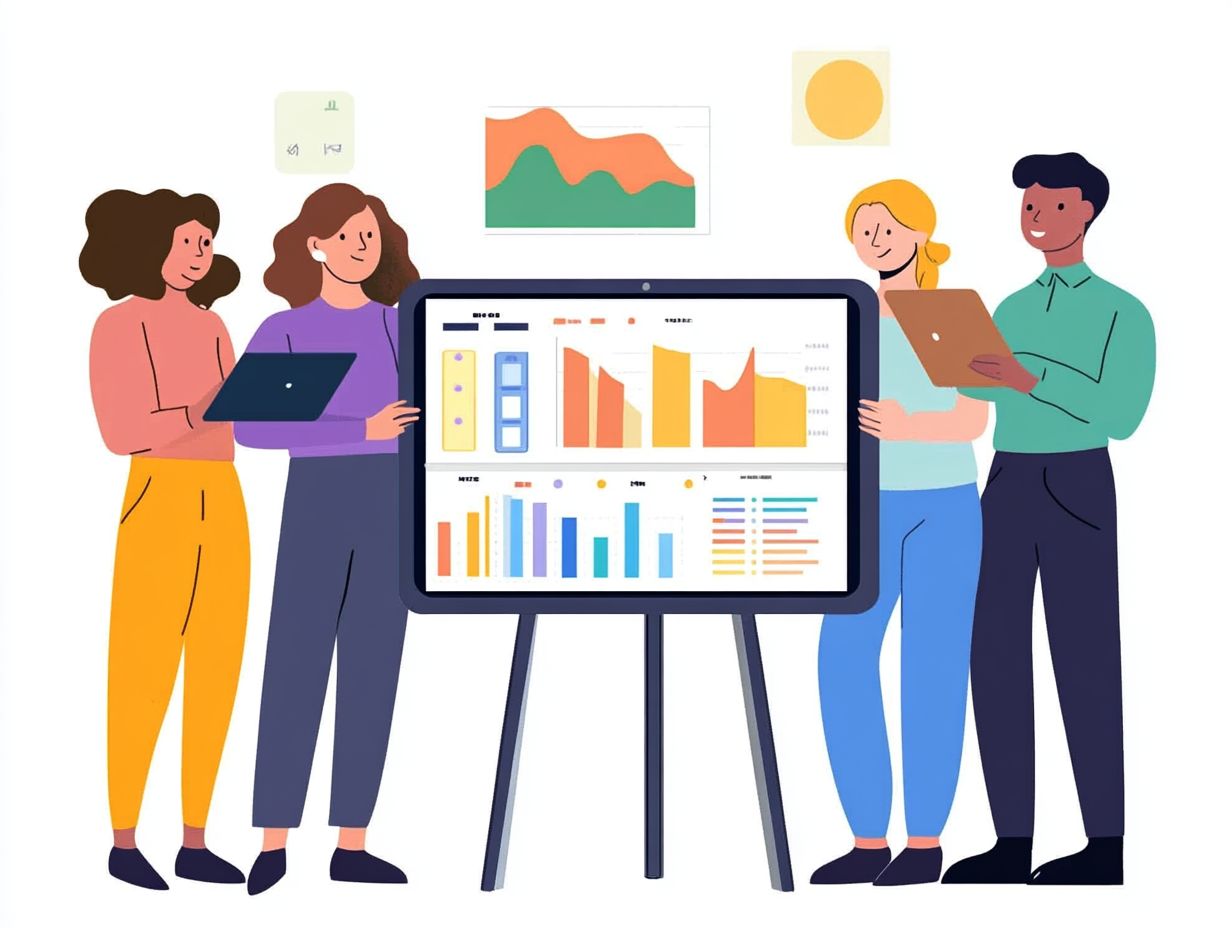the future of reporting in project management
In today s fast-paced business environment, project management reporting has become more vital than ever. It serves as an important way to share information, enhancing your decision-making, accountability, and overall efficiency.
Many organizations still grapple with challenges that hinder effective reporting. However, technological advancements are on the horizon, promising to transform your approach by providing real-time insights and seamless integration with project management software.
This article explores the benefits of effective reporting. It also highlights challenges and how to adapt to changes. Discover powerful ways to empower your team now!
Contents
- Key Takeaways:
- The Benefits of Effective Reporting
- Current State of Reporting in Project Management
- The Future of Reporting in Project Management
- How to Prepare for the Future of Reporting
- Transform Your Project Management with Agile Reporting
- Frequently Asked Questions
- What is the importance of reporting in project management?
- What will the future of reporting in project management look like?
- What impact will AI have on reporting in project management?
- How will reporting in project management evolve for remote work?
- Will reporting in project management become more transparent?
- How can project managers prepare for future reporting?
Key Takeaways:

Effective reporting in project management leads to improved communication and decision-making, increased efficiency, and a better understanding of the role of stakeholders in project reporting.
The future of reporting lies in technological advancements and automation, real-time reporting and data visualization, and the role of reporting in strategic project planning, as well as integration with project management software.
To prepare for the future, project managers should focus on developing data analytics skills and implementing agile reporting processes.
What is Project Management Reporting?
Project management reporting is vital in your project toolkit. It keeps stakeholders updated on project status, progress, and overall health.
Effective project reporting means using tools like project dashboards to visualize timelines, milestones, and team availability. This allows you to convey essential insights and facilitate knowledge-based decision-making throughout the project lifecycle.
With these tools, you play a crucial role in crafting various reports, such as risk and variance reports. These documents highlight potential challenges and deviations from planned objectives.
They reflect the current state of your project and provide valuable information that can shape future actions and resource allocation. By maintaining clear communication with stakeholders, you ensure everyone stays aligned, fostering collaboration and trust essential for navigating uncertainties and enhancing project success.
Ultimately, a well-structured reporting system promotes accountability and enables your team to address issues proactively before they escalate.
The Benefits of Effective Reporting
Effective reporting is crucial for project success. It provides a wealth of benefits that elevate project outcomes and strengthen stakeholder engagement.
By employing various project tools and methodologies, you can streamline communication and enhance the accuracy of project health reports, ensuring all stakeholders align with project goals.
Improved Communication and Decision Making
Clear communication in project management enhances your decision-making abilities. Concise reporting equips you with essential insights and updates needed to make informed choices.
This ongoing flow of information enables you to address issues proactively, ensuring your team remains aligned with project objectives.
By leveraging effective communication tools like collaborative platforms and real-time dashboards, you enhance visibility across all project phases, allowing stakeholders to grasp the project’s status at a glance.
Timely project reports keep everyone in the loop and foster collaboration and trust among team members.
When you provide stakeholders with access to relevant data and insights, they engage more effectively, contributing their expertise during critical decisions.
This synergy is crucial for mitigating risks and driving successful outcomes, ultimately ensuring your project goals are achieved within the planned timeline and budget.
Increased Efficiency and Accountability
Increased efficiency and accountability in project management stem directly from strong reporting practices. These practices allow you to effectively monitor team performance and track time.
By providing clear benchmarks and progress reports, project management reporting fosters a culture of accountability. This ensures that every team member understands their roles and responsibilities.
This structured approach not only enhances transparency but also helps you identify potential issues before they escalate.
With tools like project health reports, which show how a project is performing against plans, and variance reports that highlight discrepancies, your project teams gain deeper insights. This enables them to make informed decisions swiftly.
As a result, this proactive management style significantly minimizes the risk of delays and budget overruns. It creates a solid framework for success.
When team members consistently receive feedback on their contributions, they develop a stronger sense of ownership over outcomes. This cultivates a more motivated and efficient workforce.
Current State of Reporting in Project Management

The current landscape of reporting in project management is characterized by continuous trends and evolving methodologies. It underscores the significance of precise project status reports and project health reports, highlighting the relationship between reporting and project success.
As organizations embrace change management practices, the demand for effective reporting structures becomes crucial. This ensures both project success and stakeholder satisfaction.
Common Challenges and Limitations
Common challenges and limitations in project management reporting often arise from various project constraints, technological barriers, and the complicated nature of maintaining cybersecurity. These obstacles can hinder your ability to communicate project health and status effectively.
The constraints of any project often include limited resources and tight timelines. This frequently leads to the formidable task of aggregating and interpreting data from multiple platforms.
This task gets more complex when you need to align strong cybersecurity protocols that must remain adaptable to evolving project demands.
In such an environment, emotional intelligence is key. It enables you to empathize with team members and stakeholders, cultivating a deeper understanding of team dynamics and stressors.
By fostering a collaborative atmosphere that encourages open dialogue, you enhance transparency in reporting and ultimately bolster stakeholder confidence.
The Future of Reporting in Project Management
Get ready for an exciting shift in project management reporting driven by new technology! The future of reporting is set for significant transformation, especially in using reporting to manage project risks, fueled by advancements that will elevate real-time reporting and data visualization.
As project management software continues to evolve, you will gain access to advanced tools that allow you to track progress more effectively. This will enable you to deliver instant insights to stakeholders regarding project status and overall health.
Technological Advancements and Automation
Technological advancements, especially in AI and machine learning, are revolutionizing project management reporting. Thanks to automation and enhanced data analysis capabilities, these innovations highlight the importance of regular reporting in projects and enable you to streamline reporting processes.
You can minimize manual tasks and improve the accuracy of your project health assessments. As these technologies evolve, you can leverage tools like predictive analytics, which helps forecast project outcomes, and natural language processing for easier data interpretation.
For instance, platforms like Monday.com and Jira now feature AI tools that allow you to quickly generate reports reflecting real-time project status. This sharpens your decision-making and promotes greater collaboration among team members.
By embracing these AI-driven solutions, you can shift your focus from administrative tasks to strategic thinking. This ultimately transforms how you manage project portfolios and assess risk.
Act now to harness these tools and stay ahead in your projects! Implementing these strategies will greatly enhance your team’s performance and project outcomes.
Real-Time Reporting and Data Visualization
Real-time reporting and data visualization have become essential elements in effective project management, enabling you to track project health and status in real time. These tools offer immediate access to vital project insights, allowing for proactive decision-making and swift responses to any issues that arise.
By harnessing these innovative technologies, you can pinpoint bottlenecks and monitor project milestones with exceptional clarity. Platforms like Tableau and Microsoft Power BI tools used to visualize and analyze complex data provide intuitive dashboards that visually represent data, making it effortless to identify trends and anomalies at a glance.
Tools such as Asana and Trello provide real-time updates. This ensures all stakeholders stay informed about project developments. In a landscape where project timelines and budgets are constantly under scrutiny, having these resources at your fingertips can greatly enhance overall efficiency, ultimately steering your project toward success.
Integration with Project Management Software

Integration with project management software is essential for you to fully leverage the potential of project reporting. It enables you to gather, analyze, and present data effortlessly.
By utilizing a suite of project tools, you can extract valuable insights that facilitate knowledge-based decision-making and enhance the overall health of your projects. Linking different applications gives you a comprehensive view of important measurements that show how a project is performing.
This fosters a collaborative environment where everyone stays updated with real-time data. Streamlining communication between various platforms not only enhances the flow of information but also minimizes the likelihood of errors, ultimately driving efficiency in your reporting processes.
This interconnectedness allows you to quickly identify trends, troubleshoot issues, and adjust strategies as needed, ensuring your projects remain on track and aligned with your business objectives.
Ultimately, thoughtfully integrating these tools reflects your commitment to continuous improvement and innovation.
How to Prepare for the Future of Reporting
Act now to prepare for the future of reporting in project management. This necessitates improving your data analysis skills and understanding the role of reporting in project accountability while implementing agile reporting processes.
These advancements can greatly elevate your project planning and execution. As the project landscape evolves, it s essential for you to adapt your reporting strategies to stay competitive and relevant.
Developing Data Analytics Skills
Improving your data analysis skills is crucial for you as a project manager aiming to elevate your reporting capabilities and uncover meaningful insights within your projects. By harnessing analytical tools and techniques, you can interpret data more effectively, forecast project health, and make informed decisions that propel your project toward success.
In today’s data-driven environment, your ability to analyze trends and metrics can be the distinguishing factor between projects that thrive and those that stumble. This skill not only equips you with the means to visualize project performance but also cultivates a proactive approach to risk management.
To effectively cultivate these skills, consider engaging in workshops that focus on data analysis software like Excel or Tableau. Participating in online courses that delve into key metrics relevant to your industry can also be beneficial. Additionally, seeking mentorship from seasoned analysts can provide invaluable insights.
By regularly reviewing project reports through a data-centric lens, you can sharpen your ability to identify patterns and insights that might otherwise remain hidden.
Transform Your Project Management with Agile Reporting
Implementing agile reporting processes can elevate your project management game. You can adapt quickly to changing project conditions.
Stakeholders gain increased transparency, helping them make informed decisions swiftly. Agile methodologies streamline communication and ensure everyone aligns on goals.
As project scopes shift, these reporting processes provide real-time feedback. This allows for adjustments that can improve outcomes.
Collaboration fosters stakeholder engagement, creating a more invested team atmosphere. Embracing agile reporting can dramatically transform your project success don t miss out!
Frequently Asked Questions
What is the importance of reporting in project management?

Reporting keeps stakeholders informed about project progress and challenges. It helps identify issues, enabling timely decision-making.
What will the future of reporting in project management look like?
The future will be more data-driven and automated. Technology advancements will allow tools to generate real-time reports, improving efficiency.
What impact will AI have on reporting in project management?
AI will analyze large data sets, generating precise insights. It will automate reporting, freeing project managers to focus on other tasks.
How will reporting in project management evolve for remote work?
Reporting will become more accessible and collaborative. Tools will allow for real-time communication among team members, regardless of location.
Will reporting in project management become more transparent?
Yes, with technology, stakeholders will access real-time data, enhancing transparency in project progress and decision-making.
How can project managers prepare for future reporting?
Stay updated on project management tools and trends. Improve data analysis skills and foster a culture of transparency for effective reporting.






